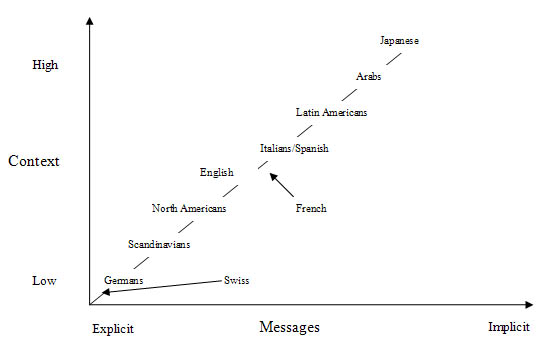If you are planning entering to Chinese market to begin to understand the Chinese culture we have to know that it is over five thousand years old, or rather it has a five-thousand year written history, making it the oldest civilization in the world.[1]
It is important to understand when entering to Chinese market that China is not religion based; it has been influenced by three philosophical traditions: Taoism, Confucianism and Buddhism.[2] Taoism means life in harmony with nature, Confucianism deals with human relationships, and Buddhism, people’s immortal word.[3] The lack of religion makes the Chinese society not so rigid; in fact it is pretty flexible. China is a collectivistic and high-context culture, this is in part due to the family and group oriented approach they have towards the individual.
The force of Yin and Yang is something else which has influenced the Chinese way of living a lot. This aspect of a positive and a negative side is to this day highly influential in the Chinese society.[4] These opposite forces seem to have been somewhat forgotten these days when money and material possession have become more and more important, in the last decades the importance has soared, leaving more traditional values behind. This is where Yin and Yang have a hard time maintaining an important part of the modern Chinese society. Yin and Yang stand for balance, in this scenario between material wealth and spiritual wealth, today’s society strive for more material wealth, not caring about the balance.
In the Chinese society power is much centralised, as Hofstede discusses there are large power distances. In the traditional Chinese society there were four social classes: the educated class which had a high status, which was followed by the farmers, workers, and the business running classes.[5] Even though these classes do not exist in the same manner any more, the power structures are still visible.
Another important factor to the Chinese society is their secrecy. They want to hold everything within themselves or their family. This is especially true when discussing business, here the secrecy level is very high.
Families are also an important term.[6] This is where Chinese people put the family before themselves. They see their family or a social group as more important than their person. This is something basically all literature talks about and it is somewhat of a cornerstone of the Chinese society. Chinese values are based more on personal duties than on individual rights.
Chinese Business Culture
Let us start this part by mentioning a vital part of Chinese business: “Guanxi”[7]. Guanxi literally means “connections” and it stands for any type of relationship. In the Chinese business world it is also understood as the network of relationships among various parties that cooperate together and support one another. It is much more than “net-working” in the west, Guanxi is about going to your business partner’s home bearing gifts, being polite, treating the right people with dignity. It is an ongoing process which takes both money and time, but without it, it is virtually impossible to do business in China.[8] Without Guanxi one will probably get stuck in the Chinese bureaucracy, because where bureaucracy puts up red tape, Guanxi rips it apart. Guanxi is above law and bureaucracy, this is where one uses the people within the Guanxi who can help you go around and skip laws and regulations. In China Guanxi is basically synonymous with businesses that are in close contact with each other.[9]
Moreover the business climate is one of patience, they are not so concerned about the saying “time is money”; they rather build up a relationship over a period of time which will eventually lead to the signing of the contracts.[10]
Chinese people think business competition and military warfare have many common features, military and business strategies can therefore be mutually exchanged. Chinese businessmen often take on more than one role, sometimes coming across as a bit contradictive. They are often a mix of a Sun Tzu strategist, a Maoist bureaucrat and a Confucian gentleman.[11]
There are also very different business climates, for doing business in China today compared to doing business in Europe. In the west the workforce carry a big part of the cost for companies; the business climate is one of innovation. China is however labour abundant and the rights and cost of employees are basically non-existing.[12]
They also view the fact of copying, or imitating in a totally different manner. They see it as obvious, something smart to copy something that works.[13] Let us say a hardware store opens on one street and business is booming, within a month or two the street will be filled with hardware stores. This is nothing bad or wrong, it is as mentioned something which the man who opened the first store can be proud of and the ones who followed him can be proud of the fact that they also thought of opening a store there.
When we in the west discuss hierarchical structures and hierarchical leadership it does not really translate well into Chinese. In China this means high organisational pyramids and a high degree of centralization.[14] Hence, not something negative, as we perceive it in the west. When the boss keeps a tight watch on its employees it is viewed as something positive, not as something negative. A Chinese boss usually has a strict leadership role, and is very precise in his demands, not leaving any room for personal interpretation. That is in turn how the Chinese employees want to be led. At the same time the Chinese business leaders are known for their flexibility and ability to adapt. They are in general highly perceptive towards new ideas and learning.[15]
High- versus Low-context cultures
Differences in the levels of high- and low-context cultures (also known as individualistic and collectivistic cultures) may have an impact on the difficulties that surface in a cross-cultural meeting. The concept was introduced in the 1960s by the cross cultural researcher Edward T. Hall. He compared different characteristics such as communication, sense of self and space, eating habits, time consciousness, values and norms, beliefs and attitudes etc. in countries all over the world and found two extremes on the contextual scale.[16]
Hall found a relationship between the differences in the levels of context, and level of explicitness of the message and the result can be plotted in like in the following figure:

Fig. The contextual continuum of differing cultures, Usunier, J.-C., 2000 (Hollensen p198)
China is not in this figure, but since it is a high-context country China would place itself close to Japan in the figure.
The low-context countries, to which the U.S. and Western Europe belongs, are straight forward in their communication, they eat because it is a necessity, their time consciousness is linear and exact and the saying “time = money”[17] is deeply rooted in the individualistic countries. They value independence and whenever there is a conflict they want to confront the other party to solve the matter. They are also egalitarian and challenge the authority and they are very deal oriented and value work and reward achievement[18], as opposed to the relation focused high-context countries in the east[19].
On the other end of the scale we have collectivistic and high-context countries such as Japan, China and Saudi Arabia. Their communication is rather implicit and they interpret the elements surrounding a message to develop an understanding of it. Eating to them is a social event and it takes a long time (from our western point of view) to strike a deal when so much importance lies in building a relationship before deciding to trust the other party and go into business with them[20]. They have an elastic relationship with time which can be seen as frustrating through western eyes and vice versa when something as important to westerners as time is being loosely dealt with in the high context-cultures[21]. Again, all depending on from what side you look at it.
The collectivistic oriented countries are, as opposed to the individualistic oriented countries in the west, hierarchical and authority is highly respected.[22] The high respect for authority is partly due to the Chinese national tradition of not wanting to “lose face”[23] or cause the other party to lose face. “Face” is about the positive social values, reputation, self-dignity and prestige a person has. To lose that is a life and death situation in Chinese minds.[24] The European are not afraid to challenge authority or “criticise” (Through Chinese eyes) someone by asking questions in front of others, this behaviour can unintentionally offend the Chinese[25] and after that a good relationship ground to do business from can be difficult to achieve.
The European way of doing business is, according to this theory, deal oriented, as opposed to the Chinese way which is relationship oriented.
Read also:
[1] Fang, T., Chinese Culture and Chinese Business Negotiating Style, UniTryck, Linköping, 1999
[2] Fang, T., Chinese Culture and Chinese Business Negotiating Style, UniTryck, Linköping, 1999
[3] Fang, T., Chinese Business Negotiating Style. A Socio-Cultural Approach, UniTryck, Linköping, 1997
[4] Chu, C.N., The Asian Mind Game, Macmillian Publishing company, New York, 1991
[5] Bjerke, B., Affärsledarskap i fem olika kulturer, Studentlitteratur, Lund, 1998
[6] Bjerke, B., Affärsledarskap i fem olika kulturer, Studentlitteratur, Lund, 1998
[7] Lafayette De Mente, B., Chinese Etiquette & Ethics in Business. A penetrating analysis of the morals and values that shape the Chinese business personality, McGraw-Hill Professional, 1994
[8] Lou, Y., Guanxi and Business, World Scientific, Honolulu, 2000
[9] Lou, Y., Guanxi and Business, World Scientific, Honolulu, 2000
[10] Fang, T., Chinese Culture and Chinese Business Negotiating Style, UniTryck, Linköping, 1999
[11] Cleary, T., The Art of War by Sun Tzu, Shambhala, Boston, 2005
[12] Krugman & M. Obstfeld, International economics . Theory and policy, Addison Wesley, 2005
[13] Bengamin, G., Early Warning . using competitive intelligence to anticipate market shifts, control risk, and create powerful strategies, Amacom, New York, 2004
[14] Bjerke, B., Affärsledarskap i fem olika kulturer, Studentlitteratur, Lund, 1998
[15] Bjerke, B., Affärsledarskap i fem olika kulturer, Studentlitteratur, Lund, 1998
[16] Hall, E.T., Beyond culture, Anchor Books, New York, 1981
[17] Hollensen, S., Global Marketing . a decision-oriented approach, Prentice Hall, Essex, 2004
[18] Hall, E.T., Beyond culture, Anchor Books, New York, 1981
[19] Fang, T., Att göra affärer i dagens Kina, SNS Förlag, Stockholm, 2005
[20] Fang, T., Att göra affärer i dagens Kina, SNS Förlag, Stockholm, 2005
[21] Hollensen, S., Global Marketing . a decision-oriented approach, Prentice Hall, Essex, 2004
[22] Hollensen, S., Global Marketing . a decision-oriented approach, Prentice Hall, Essex, 2004
[23] Fang, T., Att göra affärer i dagens Kina, SNS Förlag, Stockholm, 2005
[24] Fang, T., Chinese Business Negotiating Style. A Socio-Cultural Approach, UniTryck, Linköping, 1997
[25] Chinese Business culture. Golden Hints for Doing Business in China, British Embassy in Beijing, http://chinese-school.netfirms.com/goldenhints.html, 22/02/2014






